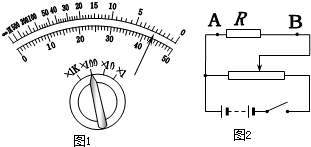问题
问答题
在使用万用表的欧姆档测量电阻时,使用前指针已指在左边零刻度,然后将选择开关打至任何倍率的档位,两表笔短接调零时发现,指针始终无法指到电阻零刻度,最多只能向右偏至图1示位置,为了解决问题,下列的哪些做法是可行的:______
A.利用螺丝刀调节机械调零旋纽,使指针偏至电阻零刻度
B.更换新电池.
欧姆表修理好后,为了测定电阻R的阻值,某同学将电键断开,选择适当的倍率并进行调零,然后将红黑表笔接在图2 AB两点间,则其测量值比真实值______(填“偏大”、“偏小”或“相等”)

答案
由于使用前指针已指在左边零刻度,所以方法A不可行;
根据闭合电路欧姆定律可知,若电池已报废使得电动势降低内电阻最大,从而电流过小致使指针始终无法指到电阻零刻度,应更换新电池,
所以方法B可行.
由图2可知,此时欧姆表测量的是待测电阻R与变阻器左半部分的并联电阻,由于并联电阻小于任一支路的电阻,所以测量值比真实值偏小.
故答案为:B,偏小
